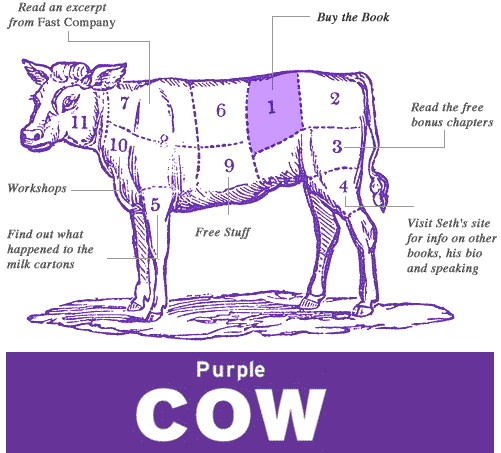In a world where everyone is in search of the magic bullet that will increase both sales and website traffic, what if I told you that all you had to do to start immediately performing at a higher level is to differentiate yourself from your competition?
To paraphrase Seth Godin, there are a lot of brown cows out there – but nobody notices brown cows. If you want to get noticed, you have to be a purple cow. A purple cow in a field full of brown cows is sure to get noticed.
Want to be a purple cow? Read on to learn how to stand out from your website’s competitors:
Know Yourself
The best brands in the world know themselves. They know their strengths, their weaknesses, their successes, their failures – and they know not only where they are now, but also where they’re going in the future. A successful brand is one with one foot planted firmly in the present that also knows where to place the other foot in the future. You only get to this point by taking a true audit of everything you do – right and wrong.
Know Your Competitors
What do they do right? Is there anything they’re offering that you aren’t? When thinking in terms of consumer experience, what can your competitors offer that you can’t?
Once you understand the reason behind why people aren’t choosing your company, it’s much easier to fix any holes in your website or product offerings that are holding you back.
Create a Differentiator or a USP
Great websites and great brands do things differently than others. They offer what’s called a “unique selling proposition” or USP. Finding your USP requires serious introspection and keying on that one item or trait that separates you from your competition. If you don’t have one, create it.
Specialize
There is a time and place to be a jack-of-all trades, but the web isn’t one of them. In a place where consumers can find just about anything from the companies that specialize in these items, they aren’t going to want to purchase one item that you really excel and several others that are of a mediocre quality. Find what you’re good at it – additional offerings are just noise.
KISS
Keep it simple, stupid. There are two basic principles to the KISS method when it comes to online business…
The first is making your product or service easily understandable at a glance. If the average consumer needs to watch a three-minute video to understand what it is you do, you’re losing customers.
The second KISS method revolves around user experience. GoDaddy might make a ton of money selling domains and upgrades, but their checkout process – with all of its upgrades and add-on options – is maddening. KISS!
Invest in Your Brand
Too often, online business owners make good money, but fail to put enough of it back into their brands in order to grow. There are always things you can make better, whether it’s enhancing your product design, user experience or additional product offerings.
Identify Consumer Pain Points
The best products and services are those that make somebody’s life easier. No matter what niche you’re in, there are pain points that you must document in order to create the products or service offerings that will make your customer’s life easier. Solve the problem; cash the check.
Hire the Best People
At some point, your web-based business is going to need additional help. And when it comes to hiring, you need to ask yourself whether your candidates truly have the potential to bring needed value to your position. If not, they aren’t for you – the world doesn’t need more mediocre employees.
Retain Them
Keeping your employees happy has been shown to increase workplace productivity, as well as decrease stress and turnover. Once you find good employees, it’s always cheaper to retain them than to go through the process of finding others, training them, and hoping they stick around.
Make Bold Guarantees
“First page of Google in 90 Days!!!”
“100,000 Facebook Fans in 6 Months!!!”
These are the kinds of guarantees that get people’s attention. While you shouldn’t offer empty promises or guarantees you can’t meet, bold statements like these are undoubtedly powerful. Remember, though, if you can’t deliver, don’t say it.
Over Deliver
Following the above examples, what if, instead of just getting a single web page to the Top 10 results in Google, you got the client a second result in just 55 days? How about 150,000 Facebook fans in just five months? People never complain about someone who over-delivers on a promise. In fact, they may just share how happy they are with others.
Track Success and Failures
It’s easy to document the things you did well. What’s much harder – but much more important – is the ability to document your failures. Having a list of things you did wrong makes you more likely to learn from the mistake, rather than repeating it. In fact, mistakes are often the best thing that could happen to a business. Success doesn’t teach the way failure does.
Be Transparent
The days of private operation of a business are all but over. Let your customers take a peek behind the screen, and show them that you’re willing to share how you do things. Customers feel safer and more loyal to brands that they feel aren’t hiding anything.
Be Innovative
Go ahead; re-invent the wheel. This goes back to the purple cow idea. If you do something differently, you’re bound to get noticed. Apple revolutionized the way in which we listen to music. What’d it get them? A bump in revenue so large that they became one of the most successful companies on the planet.
Test, Test, Test
Great companies are always testing new ideas. Even if you’re just rolling out a specific feature to a certain segment in order to gather feedback, you should always be testing. You can’t be innovative if you’re afraid to fail, and you’ll never know if a feature will be a success unless you put it out in front of your market.
Don’t Skimp
It’s easy to grab a freelancer from Elance, Guru, or oDesk to do your SEO, content and social media. Does that make it the right way? Probably not. One small flub can seriously tarnish a business’s reputation. A few shortcuts in the SEO process could lead to huge penalties from Google or being de-indexed from the SERPs entirely.
The key here is accountability. Find people that have something to lose if they make huge blunders and they’re far less likely to make them. Cheaper isn’t always better.
Get the Referral
This is “Sales 101” stuff, but online business owners often forget it. Get the referral. It’s easier than ever to get a referral online. The sale doesn’t stop with the current customer. Ask for a Tweet or a Facebook status update in exchange for a freebie or discount. It’s that easy.
The web opens up new doors that we’ve never seen before. These doors have the potential to lead to huge successes or monumental losses. Those that are making the money are those that are willing to be different from their competitors in order to deliver a better product or service than those around them. Listen to your customers, respect them, and find ways to differentiate yourself from everyone else. Follow these rules and you’ll be counting your cash in no time.





